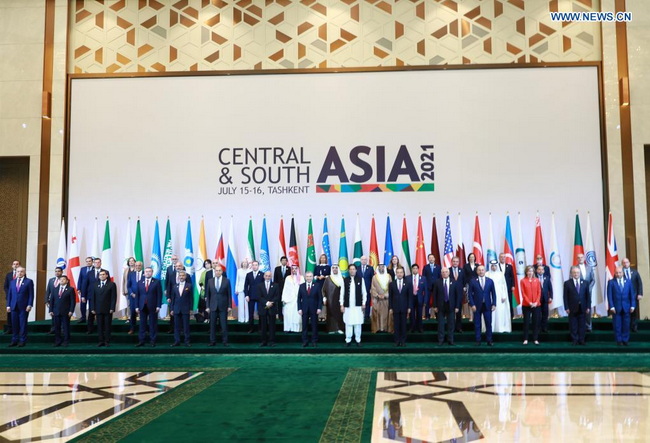
Chinese State Councilor and Foreign Minister Wang Yi (6th R, front row) attends a high-level international conference themed "Central and South Asia: Regional Connectivity, Challenges and Opportunities" in Tashkent, Uzbekistan, July 16, 2021. (Xinhua/Cai Guodong)
China stands ready to join hands with Central and South Asian countries to forge a closer regional connectivity partnership through high-quality cooperation under the Belt and Road Initiative (BRI), Chinese State Councilor and Foreign Minister Wang Yi said here on Friday.
Wang made the remarks while attending a high-level international conference themed "Central and South Asia: Regional Connectivity, Challenges and Opportunities."
Connectivity has been an unremitting pursuit of human society since ancient times, and plays as a key impetus to development and prosperity in today's world, Wang told the conference attended by leaders and foreign ministers of countries in the region.
Chinese people and the peoples of Central and South Asia have been living in adjacent to each other with a long history of friendly exchanges, Wang said.
Since Chinese President Xi Jinping put forth the joint building of the BRI in 2013, bilateral relations and cooperation between China and Central and South Asian countries have become all the more closer, he noted.
Wang made a four-point proposal on promoting connectivity in Central and South Asia.
Countries in the region should stick to openness and inclusiveness and uphold the spirit of partnership, Wang said, adding that only by staying open can they create powerful synergy for connectivity.
He stressed that China opposes playing geopolitical games in the name of connectivity and is willing to follow the principles of extensive consultation, joint contribution, and shared benefits, to create a bright future of integrated development with all parties.
Wang suggested that the countries pursue both hardware and software development in promoting infrastructure connectivity.
He said China is ready to work with all parties to align their infrastructure development strategies, push forward "hard connectivity" and "soft connectivity" in parallel, and build an all-dimensional, multi-faceted and sustainable connectivity network.
He added that China backs the building of a corridor connecting Central and South Asia, helping countries in the region transform from "land-locked" to "land-connected" nations, and jointly building a major international transport route connecting Europe with Asia and linking the north with the south.
Wang suggested the countries adhere to the principle of mutual benefit and win-win cooperation, and increase financing services.
He called on the World Bank, the Asian Infrastructure Investment Bank, the Asian Development Bank, and the Silk Road Fund to invest in connectivity projects, broaden diverse financing channels, and widely attract investment from private and social sectors so that these projects will receive stable, transparent and high-quality financial support.
In addition, Wang said the countries should stick to the principle of common security and overcome obstacles in the cooperation.
China urges relevant countries to honor their commitments, fulfill their obligations, and strive to prevent the deterioration of the security situation in Afghanistan, he said.
China will continue to work with the international community, especially Afghanistan's neighboring countries, to facilitate peace talks and give full play to the role of the Shanghai Cooperation Organization and other mechanisms, Wang said.
He added that China will deepen law enforcement and security cooperation with all parties, jointly combat the "three evil forces" of terrorism, extremism and separatism, drug trafficking and transnational organized crimes, and strengthen the security measures for cooperation projects under the BRI, in order to create a stable, secure and peaceful external environment for the construction of regional interconnectivity.
Leaders of countries including Afghanistan and Pakistan, foreign ministers of countries including China, Russia, Kazakhstan, Tajikistan, Turkmenistan, India, Bangladesh, the Maldives, Saudi Arabia, Kuwait and Turkey, the United Nations secretary-general, and the European Union high representative for foreign affairs and security policy attended the conference, which was hosted by Uzbekistan, in person or via video link.
